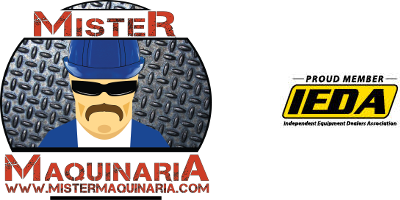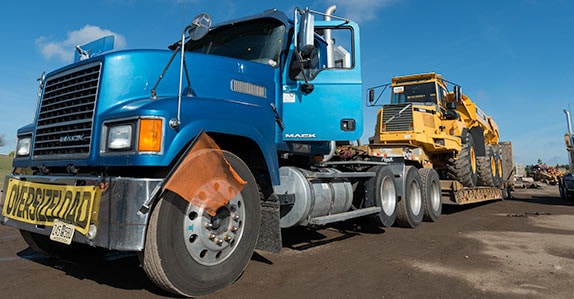De-Tiering Tier IV-interim Machines for Export – the Best of the Bunch
The Issue – Having experienced the arrival and implications of Tier IV-interim engines in the USA market I can tell you it’s been a game changer! Several years ago this was a conceptual discussion and today it is reality as used inventories across all makes and models become an issue for dealers, their rental fleets and contractors who purchased this machinery between 2010 – 2014. The historic flow of used construction equipment from USA-based fleets to owners mainly in Latin America and Africa has all but halted as weary international buyers avoid late-model Tier IV-interim machines with emissions equipment and require special low-Sulphur fuel.
The Solution: Conversion and Export – the best way to resolve the issue of bloated inventories is to convert Tier IV-Interim machines by removing the emissions equipment, reprogramming on-board computers and making them ready for use in traditional USA markets.
The best solution I have seen to date comes from Volvo and involves the complete removal of all emissions equipment “downstream” of the turbo, plugging the appropriate holes, installing a traditional muffler/exhaust pipe and finally, re-programming the computer to “tell” the engine it is now a “Tier Zero” capable of utilizing diesel fuels available in international markets. Why is this the best I have seen to date? In short because after conversion, the machines will “look and feel” like the same models being delivered to those markets by local dealers. Anything else would be met with skepticism and angst by mechanics on the ground. Currently Volvo promotes the conversion being performed by Volvo Dealers in the country of destination and use…for that matter, all manufacturers have the same message as they navigate the waters of compliance with EPA guidelines versus a strong desire to reconstruct the historic flow of used equipment out of the USA market.
Other manufacturers are not as focused on finding a solution as far as we can tell. Brands like Caterpillar and John Deere are staunch advocates of keeping dealers focused on “in-channel” solutions. Caterpillar in particular does not promote any scenario whereby a USA Dealer would be involved in the sale and use of USA-based equipment to another market: in the eyes of Caterpillar that job is for CAT Used Equipment Services Inc (CUESI). This leaves the de-tiering of these other brands in the hands of independent shops, “after-market” kits, and lacks the critical software required to re-program onboard computers. In my view not sound options as they could compromise the functionality and performance of the equipment.
What You Need to Know When Acquiring Machinery
“Value” should replace “Price” when it comes to acquiring machinery, here is what astute buyers should consider
- Original Quality – machinery which is built to last and well-designed on many levels is optimal. Aside from ease of maintenance, parts availability and dealer support – one major factor should be operator comfort – ergonomics – which serves owners well without increased production and a machine likely to be maintained well by a content operator.
- Acquisition Costs – the initial purchase price, delivery logistics and nationalization costs all factor when buying a machine for import into your Country. While currency exchange rates and local economic issues also play a role, buying assets when the “market of origin” offers special deals is key: be flexible and study the source economy and availability machines with your trusted source
- Intent and Use – The working application and expected hours the buyer will use the machine is critical when making intelligent choices. Machines of lesser “original quality” may be the best decision and justification for an owner who will use the machine sporadically. Conversely, a project or application implying high-usage in a production environment calls for a solid machine with a reputation for “uptime”
- Fuel Economy – on a daily basis owners observe and manage fuel and operating costs. Machines which use less fuel for the same work when compared to competitive models demonstrate quickly why upgrading to a more fuel efficient machine should always be a consideration. Many owners never consider that fuel economy can vary greatly. Research will show is does: the daily costs of fuel and even the act of refueling a machine in a production environment will affect overall productivity.
Considering these four components when researching machinery with assure the best value when your acquisition is made!
The ABC’s of Acquiring and Importing Heavy Equipment
For many contractors and other users of heavy earthmoving equipment, the prospect of acquiring a machine from a trusted source and importing into their country is a daunting task. Many customers choose to leave that to brokers domiciled in their own country or more broadly to third-parties in the USA where the machinery originates. This process of importing heavy equipment is not as cumbersome as one may believe and “doing it yourself” with the assistance of experienced professionals will usually garner a better value for the end-user. Here is what you should know when it comes to acquiring and importing heavy equipment:
- A) Quoting and Acquisition – while there are many sources it is my experience that buying used equipment from an authorized dealer rental fleet should be the first choice. These machines are generally maintained per factory specifications by such dealers and offer quality machinery with good maintenance history, documented. Whether one deals directly with a dealer or via a trusted USA-based broker, rental fleet units are generally superior to other machines in the marketplace or advertised on the internet and via other media.
- B) Freight Forwarding – to manage the transport of equipment from your “port of embarkation” or, “where it departs the USA” to the chosen port of entry in your country where machines will be put to work, the network of proficient agents is substantial. These “freight forwarders” have the expertise to manage the logistics, clear US Customs and even perform the same functions within your country and to your jobsite or final destination. Using established freight forwarders knowledgeable in importing heavy equipment is recommended in order to avoid pitfalls which may cause delays in delivery and spending more money on this process. I have some recommendations based on a long history of superior service and performance. Concord International, Energy Systems and Hansen Shipping are three companies I feel confident referring
- C) Customs Brokerage – handling the intricacies of “nationalization” and associated tasks for importing heavy equipment into your Country should be performed by local firms as they are much more familiar with administrative process and more agile when working through potential obstacles. It is common for freight forwarding and customs brokerage activities to be managed by one organization, this is the preferred provider; a firm which has an office and local personnel doing the job.
I believe that empowering buyers to manage their own search, acquisition and delivery of equipment is the next step in the natural evolution within our industry, and I am here to assist.




Recent Comments